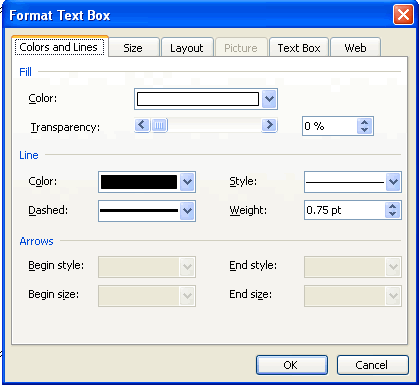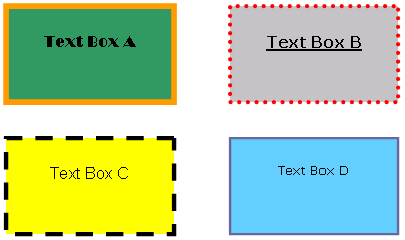/en/word2003/formatting/content/
Introduction
By the end of the lesson, you should be able to:
- Create a text box
- Move and resize a text box
Creating a text box
Placing text inside of a text box helps focus the reader's eye on the page content. Newsletters, flyers, reports, announcements, school projects, and other types of publications often use Word's text box feature.
Text boxes can be formatted with shadings, color, borders, and graphics, making for an impressive display of your Word skills.
To create a text box:
- Click Insert on the menu bar.
- Select Text Box from the menu list.
- The mouse pointer becomes a
 crosshair, and a drawing canvas appears.
crosshair, and a drawing canvas appears. - Place your insertion point where you want your text box.
- Left click and drag the text box until it is the appropriate size. Release the left mouse button when ready.
- The text box will by default contain a white background color and a thin black border.

Note: When you create a text box in Word 2003, the drawing canvas appears by default. The canvas helps you arrange and resize the objects you are working with.
To insert text into the text box:
- Click once inside the text box.
- The box is selected, and a blinking insertion point appears inside the box.
- Begin typing.
- Format text (change font, font size, and style) in the usual manner. (Select text first, and make changes later.)
Moving and resizing text boxes
To resize a text box:
- Click once on one of the box's borders. The box is now highlighted.

- Sizing handles (small circles) appear. Hover the mouse pointer over any of the sizing handles (small circles) until it turns into a diagonally pointing arrow.

- Click and drag the sizing handle until the box is the desired size.
To move a text box:
- Click once on the text box's border.
- Hover your mouse pointer over the border until it becomes a crosshair with arrows.
- Using this crosshair, click and drag the box until it is in the desired location.

The Format Text Box dialog box
As mentioned earlier, the default for the text box in Word is a white background with a thin, black border. Using the Format Text Box dialog box, you can choose different fill colors and lines, as well as size and layout.

To use the Format Text Box dialog box:
- Double-click a text box border. The Format Text Box dialog box appears.
OR
- Right-click the text box border and select Format Text Box. The Format Text Box dialog box appears.
To access the text box feature from the Drawing toolbar:
- Click View on the menu bar.
- Select Toolbar and then Drawing from the cascading menu. The Drawing toolbar appears at the bottom of your document.
- Click the Text box button
 . Don't confuse this button with the Rectangle button. You cannot insert text using the Rectangle button.
. Don't confuse this button with the Rectangle button. You cannot insert text using the Rectangle button.
- The Format Text Box dialog box offers you several tabs to choose from:
- Color and Lines: Fill text box with color and define the border colors, styles, and weight
- Size: Define a specific size
- Layout: Text wrap and alignment
- Text Box: Internal margins
Challenge!
- Open your document.
- Insert a text box or text boxes with the information you want to display on your flyer or newsletter.
- Make decisions about your text box.
- Do you want the line to be visible?
- If so, what color do you want the line?
- What type of line style do you want?
- Try to create text boxes that look similar to the ones displayed below, as well as creating your own.
- Practice using different font styles and sizes within the text boxes you create.

- Save and close the document.
Note: If you are unsure what you would like for your flyer or newsletter, try several options. Remember, you can always click the
Undo feature if you change your mind.
/en/word2003/working-with-columns/content/


 crosshair, and a drawing canvas appears.
crosshair, and a drawing canvas appears.




 . Don't confuse this button with the Rectangle button. You cannot insert text using the Rectangle button.
. Don't confuse this button with the Rectangle button. You cannot insert text using the Rectangle button.
